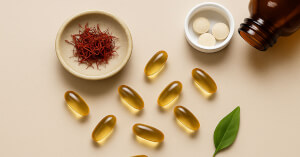
St. John's WortBenefits, Uses & Dosage
Commonly used to treat mild to moderate depression and anxiety, St. John's Wort supports mood balance and emotional well-being.
St. John's Wort (Hypericum perforatum) is a flowering herb traditionally used to support emotional well-being and treat mild to moderate depression. It has a long history in European folk medicine.
Its active compounds, including hypericin and hyperforin, are believed to influence serotonin and other neurotransmitters in the brain. It is usually taken in capsule or tincture form.
St. John's Wort is used for mood support, especially in cases of mild depression. While many studies support its effectiveness, it can interact with various medications and should be used with caution.
Other names & forms of St. John's Wort supplement : hypericum perforatum, st johns wort, hypericum extract, goatweed
Benefits
St. John's Wort contains hypericin and hyperforin, compounds believed to influence mood by affecting serotonin, dopamine, and norepinephrine levels in the brain.
- Supports emotional balance and mood, contributing to Nervous System & Stress Relief
- May ease symptoms of mild to moderate depression
- Helps reduce anxiety and promote mental well-being
Dosage
Recommended intake for St. John's Wort supplement depends on various factors including age, condition, and lifestyle:
- Mood and anxiety support: 300–900 mg/day of St. John’s Wort extract (standardized to 0.3% hypericin).
- Typical clinical dose: 300 mg three times daily or 600 mg twice daily.
- Whole herb tea or powder: Less standardized; use with caution.
- Recommendation: Avoid combining with antidepressants or medications affected by liver enzymes (CYP450).
Side Effects
St. John’s Wort is commonly used for mood support, but you may experience some mild side effects as you adjust. Look out for:
- Photosensitivity, heightened sensitivity to sunlight leading to sunburn
- Mild gastrointestinal discomfort, nausea, diarrhea, or abdominal cramps
- Possible dry mouth or dizziness in sensitive individuals
- Occasional fatigue or sedation, especially when taken in higher doses
- Rare headache or increased anxiety during initial adjustment
Interactions
Possible interactions include:
- SSRIs and SNRIs: St. John’s Wort induces CYP3A4 and P-gp, potentially reducing plasma levels of antidepressants such as sertraline or supplements like Bacopa, risking decreased efficacy or withdrawal.
- Oral contraceptives and hormone therapies: Its enzyme induction may lower estrogen/progesterone levels; use backup contraception if on birth control pills or Progesterone.
- Anticoagulant and antiplatelet agents: St. John’s Wort can reduce warfarin effectiveness via CYP induction; monitor INR closely when combined.
- Immunosuppressants: By altering drug metabolism, it may lower blood levels of cyclosporine or methotrexate; therapeutic drug monitoring is advised.
Precautions
Before adding St. John’s Wort to your regimen, confirm that none of the following apply to you. If they do, consult your healthcare provider:
- Individuals on antidepressants or mood-stabilizing medications: Risk of serotonin syndrome; avoid combining without medical supervision
- People taking birth control pills: May reduce efficacy of hormonal contraceptives; use alternative methods or consult a professional
- Those with bipolar disorder: Potential to trigger manic episodes; avoid unless under direct psychiatric guidance
- Patients on blood-thinning medications (e.g., warfarin): Possible interaction affecting clotting; monitor coagulation parameters closely
- Anyone scheduled for surgery: May interact with anesthesia and affect bleeding; discontinue at least two weeks before
Studies
These studies provide scientific insights into St. John's Wort benefits:
A 2012 Cochrane review of 29 RCTs concluded that St. John’s Wort (900 mg/day) is as effective as SSRIs for mild-to-moderate depression (RR = 1.07; 95% CI: 0.97–1.18) with fewer adverse events.
A 2009 randomized trial in 180 patients with major depression found 1,200 mg/day hypericum extract inferior to sertraline for severe symptoms (HAM-D change –9.5 vs –12.1; P = 0.02).
A double-blind RCT in 80 generalized anxiety disorder patients reported no significant anxiolytic benefit of 600 mg/day versus placebo over 8 weeks (ns).
Despite in vitro antimicrobial activity, no RCTs have evaluated St. John’s Wort for viral or bacterial infections.
This article was originally published on Stackbb.com, your trusted source for science-based supplement guides.
Related Articles

Important Disclaimer: The information provided on this page about St. John's Wort supplement is for informational purposes only and has not been reviewed or validated by a medical professional. It is not intended to substitute professional medical advice, diagnosis, or treatment. Always consult your doctor or qualified healthcare provider before starting, stopping, or changing any supplement or part of your healthcare regimen. Individual needs and responses to supplements may vary, and what works for one person may not be appropriate for another.







